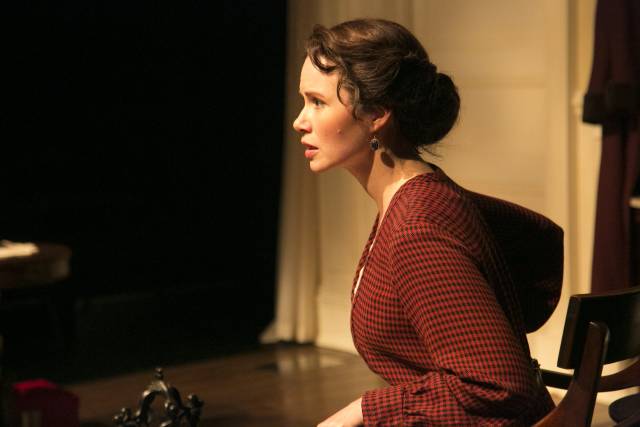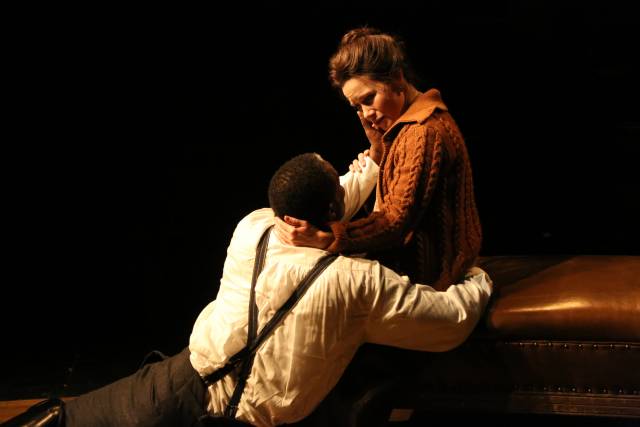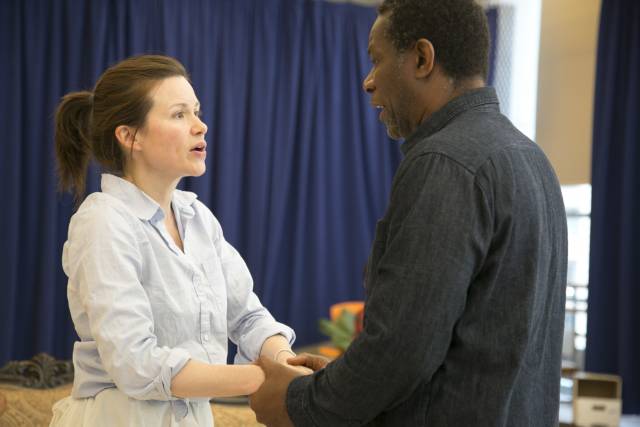

While many actors only dream of starring in classic productions by Strindberg and Ibsen, Maggie Lacey has hit the thespian jackpot by getting to play Laura in The Father and Nora in A Doll’s House, at the same time. Both plays are being done in repertory at Theatre for a New Audience, where under the direction of Arin Arbus they have become the must-see revivals of the season. Ms. Arbus establishes a dialogue between both plays by not only highlighting their opposing natures, but also revealing they share one soul, namely they both are plays featuring a complicated and complex female protagonist who must overcome obstacles presented within the plot, and also the very essence of the play.
For better or for worse, Laura and Nora are characters who are often judged quite harshly by characters around them, and also by audiences and even in a critical context. It was a stroke of genius that Arbus cast Lacey who turns in two breathtaking performances. Her Laura contains a severity that one would have never guessed Ms. Lacey could summon, her Nora is a treasure chest of joy and self deceit. She places both characters in a conversation that should challenge audiences who have judged these women in the past. Few actors turn in a performance like this in their lifetime, that Ms. Lacey is turning two, sometimes in a single day, is nothing short of extraordinary.
I had the chance to speak to Ms. Lacey about her work in these two plays, how she approaches Strindberg’s misogyny and the one musical role she’d love to do.
Let me start by expressing my awe at what you guys do on a two-day show! I saw both shows the same day and I couldn’t believe I was seeing the same cast in the evening performance.
That’s so good to hear!
Can you talk about the process of taking off Laura from The Father, so to speak, and slipping into Nora’s skin for A Doll’s House in the same day?
Oh my god, it starts really with the plays, they envelop you enough that you go into those two very distinct worlds those playwrights created for you and it’s very freeing. For me personally it’s a dream challenge, I love stretching, and the idea of playing two such strong women, especially in one day, is what I live for! I know it’s such a unique opportunity, it doesn’t happen all the time.
Laura and Nora are such opposites, and this is something that struck me as rather fascinating with other actors and the characters they play in each adaptation as well. For example Jesse J. Perez plays the Pastor in The Father and Krogstad in A Doll’s House, the latter being perhaps the complete opposite of a holy figure.
Right! That’s so wonderful, these plays are so different in every way, structurally and tonally. But then there’s all these similarities, because there was this very volatile connection between the two playwrights. It’s been so interesting to find the similarities and differences.
Right, they are in dialogue. There’s even a mention of an Ibsen play in The Father.
I know, Ghosts! Strindberg was a genius madman and had a major obsession with Ibsen. So the fact that not only did he write The Father largely as a response to A Doll’s House, he then put up another play of Ibsen in reference in his play.
I brought my 14 year old niece to see the play because she wants to be in theatre and it felt like the right time to introduce her to the heavy hitters. After the play ended she asked me “did Strindberg think all women were demonic?”
Oh my gosh, she’s so smart. Thank you for bringing her, I would have loved to talk to her.
I was very surprised by her remark because it reminded me of a conversation I had with Liv Ullmann who said part of what inspired her to make a film version of Miss Julie was to show Strindberg that women weren’t what he thought.
I admire her more than words can say.

I wondered for you as an actress how it was to enter the world of Strindberg which can be very biased against women.
First of all, we’re working with a new adaptation by David Greig, and I think it’s an adaptation that brings out Strindberg’s creepiness, it lets it is what it is, but it makes sure it’s also clear enough. When we read the first draft of his translation there are certain characters like the Doctor and Laura and we wanted to make sure we showed their humanness. Maybe I shouldn’t reveal this, but I’m going to (laughs) I read Laura, and yes she goes to extremes that I in my life would not go to, however she is in a society and in a marriage where men hold all the cards and have control of all the money and everything. The man gets educated in a much more thorough way than she was, so she hasn’t even been given tools to realize her potential and have a free spirit.
I see Laura and with every character I play I advocate for them, I try to find why they’re doing what they’re doing. I think all good plays have complicated real people rather than heroes and villains. I don’t wanna shy away from any of Laura’s less than exemplary qualities. I want to go into those darker parts of her and find out why. The thing I must reveal is that she makes complete sense to me! Strindberg himself had very complicated relationships and opinions of women, but he also wrote this great manifesto in which he said that women should get to vote, and that they didn’t have to be married if they didn’t want to. It’s certainly flawed in terms of our modern feminist criteria, but he’s not totally the misogynist he’s painted to be. I think he was wildly plagued by women and he put his darkest feelings about them in characters like Laura. Strindberg may have sometimes seen her as a mustache twirling villain but that’s not interesting for me, in my own homework I need to find who this woman is. She’s not that, she’s a set of contradictions. I’ve heard people in the audience who hate Laura, but others - mostly women - they get it. I think both of these plays are about marriage being a corrosive vessel to love, and that people who once were in love sometimes fall out of love, and why this happens.
I love Nora in A Doll’s House, I have always understood why she does what she does and in fact I applaud her decision to leave in the end because she realizes she doesn’t know herself, so she will never be able to raise her children. I don’t think she’s a bad mother.
I can’t tell you how much I love hearing that. That was such a scary part of the play for me. We worked on the play and it’s done so eloquently.
This is a very shallow thing to ask, but the tarantella scene has always struck me as great because it encompasses the craft of acting. Nora puts on a costume to make her husband happy for the last time she’ll be able to. How is it for you to give this performance within a performance?
That’s not shallow at all, in fact I think this is thrilling. We don’t get a lot of previews, and sometimes in front of an audience we feel like we’re rehearsing, which is why I like to go to previews because they make you feel like you’re part of the process. Nora is performing a lot in the play, the tarantella is the most extreme form of that and it’s exhilarating for the reason you just said. It’s such a clear example of her doing a play within a play, and then when it’s over we see her at this very raw private moment where the artifice drops because nobody else is there. The tarantella is now different than when you saw it for instance, we’re always working on that.

The version of A Doll’s House you’re in was adapted by Thornton Wilder. You made your Broadway debut in Our Town, so have you found any Wilder-isms in this adaptation?
Yes! Again, this is so multilayered for me because of that. I have found some Wilder-isms, the end of Our Town when Emily is saying goodbye to everything, there are similar moments in A Doll’s House, we actually defined them a little bit better in the last performance we did, we had Nora look at her gloves and belongings in a different way when she considers suicide as a way to get out of things. She’s saying goodbye to her own things, her beautiful gloves, the children. She even says goodbye to her husband and by the end of the play she walks out in a simple outfit, unlike anything we’ve seen her in before. She’s going to start from scratch.
On a personal level, I was a lot younger when I played Emily and I can look back on myself and that time and sort of see how I sometimes was a little bit more like Nora in the beginning of the play thinking I had to please certain people for instance, and being open and confused. I remember sometimes not even being able to finish my sentences in rehearsal, I was intimidated by male colleagues and feeling I couldn’t get my voice to be heard. Not that the men were rude or bad or anything, it was more like Nora that I had to find myself as an individual. I love our adaptation, I love how clean and spare Wilder made it, I feel I’m even closer to the play because it’s his adaptation.
I don’t think I’ve ever seen you doing musicals or if you’re even interested in them, but I saw your husband Bill Heck in Cabaret, and now I want you to play Sally Bowles!
Oh my god, you just hit on the one thing that I dream to play (laughs) Bill did the whole run and I saw all Sally Bowles, I don’t have a big, amazing musical theatre voice but I always sang, with my sisters growing up we did musicals, so I love to sing. But I need a role where you don’t need a big Kristin Chenoweth voice, so I would love to play Sally Bowles or another part like that. When I’m a lot older maybe I could play Desirée and sing “Send in the Clowns”, Sondheim is great!
For tickets to A Doll's House and The Father click here.